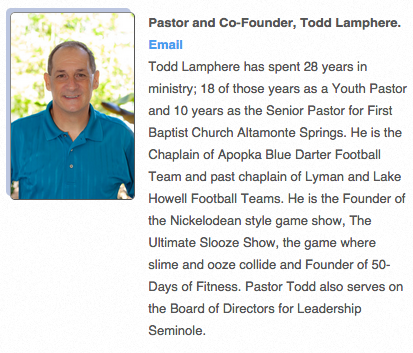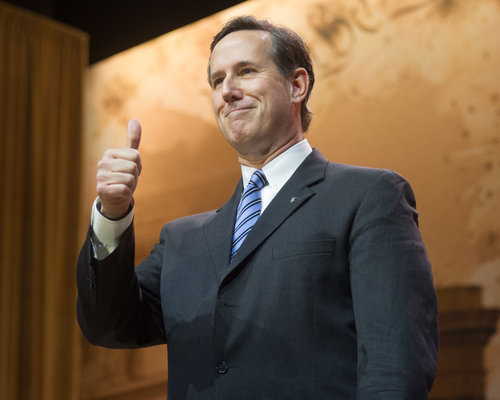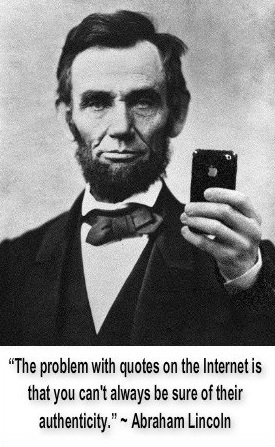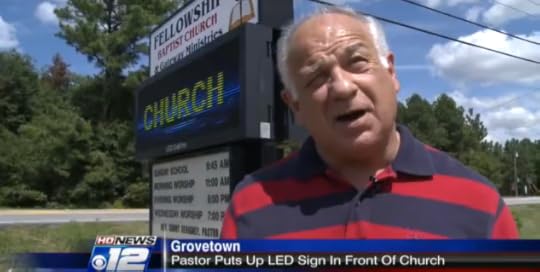Hemant Mehta's Blog, page 1941
August 28, 2014
Say It With Me: I’m a Hispanic Atheist
This is a guest post written by César J. Baldelomar. César is currently a student at the Florida International University College of Law. He has written several articles on politics, culture, and religion.
…
Though I grew up in a moderately Catholic household and attended Catholic institutions from age three until my college graduation from St. Thomas University, I felt a constant struggle between accepting what others were saying I should believe and what I thought was the intuitive, rational choice. Yet it is only now that I finally have the courage to publicly state that I am an atheist.
Perhaps my struggle was made more poignant because I was raised by Latino parents in one of our country’s most socially conservative cities (Hialeah, Florida). That may have been why I decided to go into religious studies as a graduate student at Harvard Divinity School (HDS). An institution renowned for its trend-setting scholarship and social progressivism, HDS was my top choice for the study of religion, ethics, and politics. I refused to attend another Catholic institution that would not allow me to pursue my intellectual curiosities, including the history and intellectual underpinnings of freethinking.
During my last year there, I took a course titled “American Unbelief: From the Enlightenment to the New Atheists.” It was a chance to explore, academically and personally, the tenets of atheism and agnosticism. More importantly, with a vast array of academic resources readily at my disposal, I was free to research why Latinos in the United States were unwilling — even afraid — to declare their non-theistic status.
To my surprise, I discovered that over 2,000,000 Hispanics consider themselves religious “Nones,” meaning they don’t identify with any religious organization or spiritual practice. I began to wonder how many of these Nones were actually atheist or agnostic but hesitant to identify as such. This, in turn, led me to focus on and criticize media portrayals of all Latinos as extremely religious, honoring the Virgin Mary, or celebrating Christmas around a makeshift nativity scene. What message does all of this send to those Hispanics who identify as nonreligious?
It’s quite simple: shame. Denying our existence reinforces the stereotype that all Hispanics are religious or spiritual, when in fact a significant number of us are not. Remember also that many non-religious Latinos, especially young ones, remain unaccounted for because religious, political, and community leaders simply assume they are Catholic or Protestant, thus effectively ending any conversation before it even begins.
I taught religious studies and philosophy in high school in Boston and Miami for four years, and I can say with confidence that the majority of my Latino students doubted the existence of God. They viewed religion as antiquated and dogmatic. Still, they felt that eventually they would “find Jesus” or “return to their childhood religion” because of familial and societal pressures. Latino families tend to be extremely close knit, often forming an intellectual, social, and spiritual cocoon around their children. An unfortunate result of this “familial cocoon” is the expectation that children will live according to traditional “family” values, including following a faith tradition.
I believed from an early age that Jesus did not exist and that God was simply a man-made invention. Yet I felt shame in saying such things publicly, partly because of my background, and partly because of the pressures in our society.
With the Latino population growing in the U.S., it’s time for that community to acknowledge that many within it do not have a belief in God. There are a number of things Latinos struggling to identify as Nones can do right now to start changing that: Seek support from atheist and freethinking websites that focus specifically on Hispanic identity (such as Latino Atheists or Hispanic American Freethinkers); encourage dialogue with Latino theists about the merits of freethinking in the modern age; and develop educational and multimedia materials that actively engage questions of ethnic identity in relation to nonreligious or religious belief.
By straightforwardly addressing the questions of identity and freethinking, we become visible to the Latino community (and to others) — perhaps encouraging other Hispanic freethinkers to emerge from the shadows. Once we become partially visible, we may begin to influence an entire generation of Latinos, who will in turn, through their votes and perhaps active political participation, shape public policy and education in our country. Shifts in family values and traditions will accompany these political and educational changes. Yes, we Latino Nones have our work cut out for us, but with a little patience and persistence, we will be able to overcome the shame that many of us felt and continue to feel for thinking differently.
(Image via Shutterstock)
Megachurch Pastor Uses Drone Imagery to Convince People to Come to Church
If you were to make a list of the problems with religion, topping that list might be its involvement in wars, both real and cultural. Religion can be used as a weapon to marginalize different groups of people (like the LGBT community) and we’ve all seen the physical destruction devout faith can cause in different parts of the world.
So if you wanted to convince people to come to your church, using a war metaphor would be a pretty horrible way to do it.
But that’s what Fellowship Church Pastor Ed Young has done. The man who owns a personal jet and asked his congregation to give him direct access to their bank accounts created a movie trailer for his recent sermon series making the connection between God and a weapon of war:
Yep, God is a drone. Because they both watch over you… and they both have the ability to ruin the lives of innocent people.
(I’ve heard of drones in church, but they’re usually the ones speaking. *Cue rim shot*)
Matthew Gault is rightfully disturbed by the connection:
… the drone metaphor is a terrible and disturbing one. It trivializes the big questions about a scary new technology and equates God with a weapon of war.
…
We asked Young about his choice of metaphors. He explained that he was following Jesus’ example. Young explained that Jesus made use of cultural icons his culture could connect with to strengthen his sermons. “We do the same thing,” Young said. “We try to use things that our culture can identify with.”
Young also claimed he never thought of Drones as scary. “I hadn’t really thought about it being ominous but you probably have a good point.”
That didn’t stop him from giving a month’s worth of sermons about the connection — you can see the first one here. It’s a loose connection at best and one that plays right into his critics’ hands… but it’s manly and powerful and that’s pretty much catnip for someone like Young.
As someone who has (*ahem*) made unwise comparisons involving God before, I would urge Young to step back from this one.
There’s No Reason Public High Schools Need Chaplains for the Football Team
While we’re on the subject of Christians who think they can get away with breaking the law, what’s with all these pastors who think they can double as chaplains of the local public high school football team?
This is not okay at a public school
The Freedom From Religion Foundation sent letters earlier this year to schools in Florida’s Orange and Seminole counties warning them about that problem (among several other issues). The districts are finally getting around to tellings coaches they can’t have team chaplains and the pastors are not taking the news well:
Pastor Troy Schmidt, who has been working with the Olympia High School team for at least six years, replacing other chaplains, said he still plans to prepare meals for the team with his church, First Baptist of Windermere.
“My heart is with Olympia. I love the kids,” he said. Until last week, he had served as a spiritual adviser to the team, including leading them in prayers and said he never got a single complaint.
“Everything I’ve done has been centered around the Bible, but I’ve tried to apply it to football,” Schmidt said. “I know I’m speaking to Christians, to Muslims, to atheists. I’m speaking to teenagers who are at that important phase in life where they’re making critical decisions.”
He just admitted the problem: He’s a Christian leader being brought in to lead the students in prayer. It’s not surprising that no one has complained since who wants to be the student who rocks the boat and gets punished for it (officially or socially)?
Schmidt appeared on Fox & Friends this morning, by the way, to talk about how he’s being turned into an “atheist chaplain” because he can’t promote Jesus at a public school. Because, in his warped mind, that’s the same as being forced to tell students God doesn’t exist:
(To state the obvious, no one’s telling anyone to become an atheist against their will.)
Another pastor, Todd Lamphere of The Venue Church, still lists team chaplain as part of his job description:
This shouldn’t be a difficult issue. Students are welcome to drop by the church if they want spiritual guidance from a Christian. There’s absolutely no reason to have a religious leader pray to a Christian God with the team, though. Their hearts may be in the right place, but the law matters more.
The students, as always, as welcome to pray on their own. No one’s stopping them. No one ever has.
(Image via Shutterstock. Thanks to Brian for the link)
Rick Santorum Wrongly Thinks Students “Can’t Pray in School”
In an interview with the website Vocativ, former presidential hopeful Rick Santorum explained (again) that he really doesn’t understand the causes he fights so vehemently against:
The movie argues that the observant are being forced to practice in private, for few hours in church on Sundays. But on a personal level, can’t you observe your religion wherever you want?
Not necessarily. You can’t pray in school, but it’s good to have prayer. Are people offended by prayer? Sure. But the constitution gives us the right to offend. There are a lot of things today in America that offend me.
Since when can’t you pray in school? I support the rights of students who want to pray in school. So do the ACLU and FFRF and other church/state separation groups.
What those groups combat is school-sponsored prayer, like a teacher leading a prayer in the classroom, or a football coach praying to Jesus before a big game, or a principal praying to God during graduation.
But it’s much easier to play victim when you make up all the facts.
You also have to appreciate the complete turn of phrase Santorum uses on another question:
So what about the Quran? Should that be taught in school, too?
I would absolutely encourage more teaching about Islam. Maybe 50 years ago, when Islam had third-world status and not international status—maybe that was different. But given what’s going on, it’s important to teach it.
The question was whether we should teach the Koran in school just as Santorum wants to teach the Bible. But he spins that into: We should teach students about Islam.
You know what? He’s right about that. It’s important to understand Islam because it affects so much of what’s happening in the world right now. And you also need to have a proper understanding of Christianity to make sense of American politics and society.
But teaching about the major beliefs is very different than preaching a very specific belief.
Santorum, no doubt, would oppose teaching the Koran in the same way he wants the Bible to be taught.
The reason he granted Vocativ the interview was to promote his new movie One Generation Away, about how Christianity is that close to extinction because religious rights are constantly being eroded.
His own words prove that there’s nothing to worry about. If he has to make up evidence to justify the movie’s premise, it’s an indication that this is just a fake problem to begin with.
(via Right Wing Watch. Image via Christopher Halloran / Shutterstock.com)
People Are Seriously Defending Public School Plaques Given “in the Name of the Holy Christian Church”
If you visited Mountain Peak Elementary School or Longbranch Elementary School in Midlothian, Texas last year, you would’ve seen this plaque hanging near the entrances:
Dedicated in the year of our Lord 1997 to the education of God’s children and to their faithful teachers in the name of the Holy Christian Church
Soli Deo Gloria
How is that legal at a public school, you ask? It’s not. It’s very obviously not.
But it took a letter from the Freedom From Religion Foundation to have the plaques covered up with duct tape:
On June 26, FFRF Staff Attorney Sam Grover sent a letter to District Superintendent Jerome Stewart, explaining, “The plaque at Mt. Peak Elementary offends the Constitution… since the plaque specifically promotes ‘the Holy Christian Church’ and contains a Latin phrase meaning ‘glory to God alone’ or ‘glory to the only God.’ The two Latin crosses on the plaque further solidify its impermissible purpose.”
That duct tape was torn off of the plaque at Mountain Peak yesterday and school officials, for whatever reason, say there’s no plan to tape it back up. It’s a very strange thing to say considering the school’s property was tampered with…
In any case, the Christian Right group Liberty Institute says the school should stand its ground because the plaques are legal (in Bizarro World) and FFRF doesn’t have the guts to sue:
Hiram Sasser, with the Liberty Institute, says the Constitution also forbids government hostility against religion.
“This type of religious censorship just because it happens to have religious references is really hostility to religion, and that kind of hostility should not be tolerated,” he said.
Sasser believes the school district shouldn’t back down before there’s a lawsuit.
“They probably are not going to bring a lawsuit, and until they do, there’s no reason to do anything with the plaques,” said Sasser.
That isn’t just some mild religious reference like “Under God” in the Pledge. This is a christening of a public school. If the plaque was offered in the name of any non-Christian group, you know there would be hell to pay. By the way, even Todd Starnes quotes the district’s superintendent saying that their attorney advised them to remove the plaques because they “would not prevail in court if it refused FFRF’s request and a lawsuit followed.”
That doesn’t matter to all the Christians defending it, though. They held a prayer rally at the school this morning because… well, they have nothing better to do and I guess they believe their prayers will keep the plaques in place. Considering the district already agreed to remove them, the only question is whether they’ll honor their word and follow through with their promise. FFRF doesn’t sue unless they absolutely have to, but they also don’t send complaint letters unless someone in the community asks them to. The ball’s in the district’s court.
(Thanks to Brian and @OrphanBlackOps for the link)
After Religious Convocation in Mississippi School District, Officials Promise a Secular Ceremony Next Year
A few days ago, I wrote about how the Jackson Public School District in Mississippi had held a mandatory, three-hour-long convocation for all faculty members that included plenty of nods to Jesus.
You would have never guessed it looking at the properly bland event description on the district’s website:
The American Humanist Association’s Appignani Humanist Legal Center explained what happened:
Reverend Roy Maine was invited by the School District to deliver the opening prayer.
The Reverend began his sermon by asking the entire faculty to “shut your eyes please” and pray. Following that was a series of “call and responses” where he would ask the teachers, “please say amen to that,” to which they would respond, “amen!” The Reverend said that the reason they were all there was to “to see just what God’s going to do this [school] year.”
…
The religious proselytization did not end with the Reverend’s sermon. Nearly every speaker at this three-hour event engaged in some form of religious preaching, recitation of Bible verses, and invocation to “Lord” and “God.” The event was best described by our client as “one long church service.”
It wasn’t the first time he had done this. Maine spoke at last year’s convocation, too.
Thankfully, the letter seems to have worked. The AHA announced today that the school district has promised to halt the Christian prayers at future events.
… the District will ask its convocation speakers to refrain from religious activity. Additionally, the convocation committee will follow federal and state law with regards to religious activity when planning future convocations.
The AHA is pleased with the response:
“We’re very pleased that the school district has promptly responded to this issue and has made assurances that future school-sponsored assemblies will comply with the Establishment Clause,” said Monica Miller, an attorney with the Appignani Humanist Legal Center.
…
“By upholding the separation of church and state, the school district is respecting the rights of teachers of minority faiths, as well as the rights of teachers who do not profess any faith,” said Roy Speckhardt, executive director of the American Humanist Association.
The only way to verify if the District upholds its promise is to keep tabs on it next year — if the AHA’s informant works in the District, which is likely the case, that shouldn’t be too hard at all.
Time to sit back and wait for conservative leaders to complain about how, somehow, the AHA just took away Christians’ right to impose their religion on everyone else.
(Portions of this article were posted earlier)
Incorrigible Pastor and GOP Candidate Jody Hice Spreads One Misattributed Quotation After Another
I keep this smartypants meme handy on my computer desktop so I can quickly post it, when called for, in certain comment threads on Facebook.
In my experience, the most common Internet misattributions have some link to religion, a field where a reverence for facts is often doubtful to begin with and grotesque fabrications are baked right into the faith’s foundational “truths.”
The popular conceit of bamboozling meme-makers seems to be to pick a nice quotation by a relatively unknown person, and then, in order to give it the frisson of fame and the weight of authority, attribute it to someone like Mother Teresa or Martin Luther King or Mahatma Gandhi or the Dalai Lama.
A close second, at least in the United States, are the quotes misattributed to the country’s Founding Fathers.
At the intersection of those two is where we find Jody Hice.
Hice, a pastor and radio talk show host from Georgia who’s on track to become a Congressman, loves to throw around made-up quotes as if it’s going out of style. And finally, someone called him on it. Buzzfeed‘s Andrew Kaczynski details meme after lying meme that Hice has attempted to spread through social media, turning statesmen like George Washington and Thomas Jefferson into his ex post facto mouthpieces.
Rather than my quoting Kaczynski at length, I suggest you just head on over to the Buzzfeed site to get the full extent of Hice’s deceit.
In the age of Google and Bing, it’s not difficult to check the veracity of a quotation. The fact that Hice hasn’t, doesn’t, and (most likely) won’t, is really all you need to know about the fiber of his character and the strength of his fact-challenged convictions.
In true Jody Hice style, I’ll give the last word to George Washington:
If Elected Judge, Her First Order of Business Will Be Putting Up a Ten Commandments Display in the Court Building
Lauren Saucier (below) is one of four candidates vying to become a judge on the Pineville (Louisiana) City Court. And if she gets elected, she already knows her first order of business: Putting up a Ten Commandments display in the court building:
She says she’d surround it with secular documents like the U.S. Constitution, the Declaration of Independence, the Bill of Rights, and the Gettysburg Address. And that makes it perfectly legal, she said… while surrounded by an audience of local ministers.
“It can be done, and it should be done. Now is the time, and this is the place,” Saucier said Tuesday afternoon.
…
“These are historical documents that make up the fabric of our society. They’ve all influenced our laws in some way, shape or form,” she said of the five documents.
One of these things is not like the others…
Just to reiterate the obvious, the Ten Commandments didn’t influence our laws. Only two of them are actually punishable, and they’re the most common sense ideas out there (don’t kill and don’t steal).
But almost immediately after Saucier’s announcement, the other candidates fell in line:
[Fred] Pharis said he thinks displaying the Ten Commandments in the proper fashion would pass constitutional muster.
“The Ten Commandments do have a historical meaning. The Founding Fathers were Bible scholars, many of them, and a lot of them did derive a lot of the principles of our Constitution from the Ten Commandments,” Pharis said.
Bible scholars like Thomas Jefferson who cut up his copy to get rid of all the bullshit parts.
Pharis added he wouldn’t put up the display, but he would begin court each day by reciting the Pledge of Allegiance with “Under God” in it.
[Gary] Hays said in an emailed statement that he does not want to comment on other candidates’ actions, “but as the City Prosecutor and Magistrate, I have always and will continue to use the Bible, the Ten Commandments and the Constitution as my guideline for making decisions.”
If he’s using the Bible or the Ten Commandments to guide his decisions, he’s admitting to not following the law.
The only candidate who didn’t bow down before Saucier’s display was Todd Farrar… who was unavailable for comment.
Smart move, Farrar…
I would love for local reporters to ask these candidates which laws derive from the Ten Commandments. Let’s see them stumble their way through a non-answer.
Remember: These aren’t just politicians. They’re trying to become a city judge. They’re they people who should absolutely not be looking to the Bible for guidance; we have the Constitution and our laws for that reason.
(Thanks to Randall for the link)
Georgia Pastor Breaks Law to Promote His Church, Then Complains When City Threatens a Lawsuit
Here’s a perfect example of a Christian who thinks the law doesn’t apply to him because he answers to a Higher Power.
Sonny Serigney, pastor of Fellowship Baptist Church in Grovetown, Georgia, wanted to promote his church, so he installed a 19,000-bulb LED sign on church property to do just that:
The problem is that the city bans all LED signs larger than 16 square feet. Serigney would’ve known that if he applied for a permit, which he didn’t. As it stands the sign is illegal, but Serigney put it up anyway because… Jesus:
It’s a sign illegally in place, but the pastor can’t help but fight for what he believes in.
“You want me to be honest, because I wanted to honor my lord,” he said.
…
Grovetown Mayor, George James the third, wouldn’t go on camera but tells News 12, if the pastor doesn’t take the sign down, it could end in a lawsuit.
Serigney responded saying, “We still have the freedom and the right to proclaim the good news of God, and that’s all I want with this sign.”
Of course, he has every right to proclaim whatever he wants on his property — the city isn’t stopping him — but he still has to follow the law. Putting up a non-LED sign would be fine. Putting up a smaller LED sign would be fine, too. But he’s purposely breaking the law because I suppose he wants to become a Christian martyr.
He’s trying to be a hero even though no one’s coming after him. It’s pathetic, really. It’s certainly not religious discrimination since the law applies to all buildings in the city.
Why is it so hard to understand that belief in Jesus doesn’t exempt anyone from following the rules everyone else has to obey?
(Thanks to Brian for the link)
Friendly Atheist Podcast Episode 12: James Randi and Banachek
***Update***: We have several interviews from The Amazing Meeting that we’ll be releasing over the next few weeks, so enjoy this bonus episode!
…
Our latest podcast guests are James Randi and Banachek:
James Randi is the legendary investigator of paranormal and pseudoscientific claims and the namesake of the James Randi Educational Foundation. Banachek is the mentalist who created the “bullet catch” trick made famous by Penn & Teller and the director of JREF’s One Million Dollar Paranormal Challenge.
Jessica spoke with them about the difficulties of testing so-called supernatural powers, performing mentalism and fooling people, and what they still love about watching magic shows.
We’d love to hear your thoughts on the podcast. If you have any suggestions for people we should chat with, please leave them in the comments, too.
You can subscribe to the podcast on iTunes, get the MP3 directly, check it out on Stitcher, or just listen to the whole thing below.
And if you like what you’re hearing, please consider supporting this site on Patreon and leaving us a positive rating!
Hemant Mehta's Blog
- Hemant Mehta's profile
- 39 followers















